
This article was first published in The Washington Examiner on August 17, 2023. Click Here to read the original article.
This Friday, President Joe Biden will host a trilateral summit critical to American security for decades to come.
Joined by Japanese Prime Minister Fumio Kishida and South Korean President Yoon Suk Yeol, Biden hopes to “advance a shared trilateral vision” in the Indo-Pacific and beyond. Aspirations for the summit are high, but whether the leaders are truly prepared for effective trilateral teamwork, or whether Friday is just another meeting on their busy schedules, is unclear.
The White House hails the “ironclad” U.S.-Japan and U.S.-ROK alliances, but that very formulation highlights probably the most difficult immediate obstacle they face: Can America’s long-standing “hub-and-spoke” Pacific alliances be transformed, even partially, into collective self-defense structures? This is not the work of one summit, or of only these three partners. No one expects to see an Asian NATO imminently.
Nonetheless, China’s existential menace requires evolving beyond the hub-and-spoke paradigm. While Biden’s summit announcement mentions North Korea’s threat, the word “China” does not appear, perhaps for legitimate optical reasons. But if China is not absolutely central to the discussions, Friday’s summit will be a waste of time.
A strong Pacific alliance will take work on multiple fronts. For their part, Japanese-Korean relations post-World War II are colored by history, and progress overcoming that history has often been reversed by new waves of hostility, generated by their respective domestic politics. Leaders such as Yoon and Kishida have heavy lifting to do, and despite opposition, both men seem determined to try.
In their efforts, trilateral rather than bilateral security strategies and programs can be helpful. This is also how Washington can help pragmatically, moving beyond just voicing strong support for closer Tokyo-Seoul cooperation. A trilateral paradigm can give Seoul and Tokyo new room to enhance their relations, which can then permeate their bilateral dealings.
In politico-military planning, trilateral cooperation can build patterns and habits of joint effort that transcend the constraints of bilateral relations, which the respective sides often see as zero-sum exercises. In a trilateral context, allocation of roles and responsibilities, defining and planning for contingencies, and the inevitably more complex consultations, can take the edge off purely bilateral issues. For example, discussing military budgets and defense-production programs — the meat and potatoes of any successful collective-defense partnership — while often contentious, can help justify decisions by each partner in ways that would otherwise be far more difficult to achieve individually or bilaterally.
Closer trilateral cooperation is central to effective collective self-defense. For example, Donald Trump once asked South Korean President Moon Jae-in how South Koreans would feel about having Japanese troops fighting alongside them to repel a North Korean invasion. Moon was visibly uncomfortable with the question, given his domestic politics, and largely successful in avoiding a clear answer. Ineluctably, however, the logic for Japanese combat arms assisting South Korea’s defense is unassailable. It could prove far easier to realize in a trilateral structure than bilaterally.
The leaders should also discuss how Japan and South Korea can enhance other emerging Indo-Pacific alignments. The Asian security “Quad” (India, Australia, Japan, and America), for example, does not include Seoul or other key players. Adding South Korea to form a “Quint” makes sense but may not yet be ripe. Accordingly, how the ROK and others can participate in the Quad’s emerging agenda is a vital topic.
Similarly, neither Japan nor South Korea are now members of the AUKUS project for Great Britain and America to build nuclear-powered submarines with Australia, but they could easily have similar arrangements. Until Congress and the Biden administration take seriously the need for extensive increases in U.S. naval warships and submarines, not to mention more domestic shipbuilding capacity, working with Indo-Pacific allies to enlarge their respective arsenals is essential.
Finally, Biden, Yoon, and Kishida should discuss how to cooperate in fending off Chinese designs on Taiwan and the East China Sea. While South Korea has understandably concentrated for decades on North Korea’s threat, Seoul’s leadership increasingly grasps that the more serious threat, economically as well as militarily, is China. It is already a commonplace understanding for the Japanese that an attack on Taiwan is an attack on them, and Koreans increasingly see threats to Taiwan in the same light. South Korea’s interests are essentially those of Japan, and indeed of America.
Holding the line against Beijing and Pyongyang in all the waters around Korea and Japan is fundamental, and Taiwan is an essential ally for doing so. Positioned between the East and South China Seas, Taiwan is the key hinge point against China’s threat throughout East Asia. The summit leaders should be clear they will not be inhibited by Beijing’s insistence that countries either recognize China or Taiwan. There are numerous ways to engage in collective security with Taiwan as an effectively independent country, which it is, without saying so expressly.
The sheer breadth of Beijing’s challenge is more than one summit can resolve, but the need for Indo-Pacific grand-strategy thinking is urgent. Regularizing these trilateral summits would be an important practical outcome this Friday.